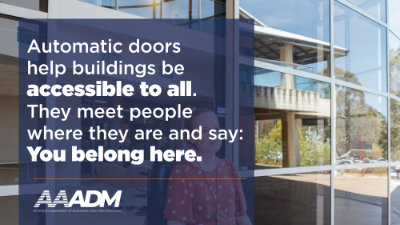| RECENT | Why We Celebrate National Automatic Door DayBlog 45, March 2026  Every year on March 19, our industry celebrates National Automatic Door Day. We’re aware it sounds a little niche. But we think automatic doors are one of those everyday technologies that quietly do their job so well, most people don’t think about them at all, and that’s exactly why they matter. They open. They close. They keep moving, just like the people passing through them. National Automatic Door Day isn’t just about patting ourselves on the back. It’s about pausing to recognize how thoughtful design can make buildings more welcoming, healthier, and safer for everyone who uses them. At their best, automatic doors remove friction—literally and figuratively. For someone using a wheelchair, pushing a stroller, carrying packages, managing a walker, or navigating the world with limited mobility, an automatic door isn’t just a convenience. It’s independence. Dignity. The difference between needing assistance and moving freely on your own terms. Automatic doors help buildings be accessible to all. They meet people where they are and say: You belong here. Accessibility and inclusion are at the heart of why we celebrate. Automatic doors don’t single anyone out. They work for everyone, quietly, equally, and without fanfare. They’re also cleaner. Over the last few years, we’ve all become more aware of how often we touch shared surfaces and how quickly germs can travel because of it. Automatic doors help reduce that risk by eliminating the need to touch handles in high-traffic spaces. In hospitals, grocery stores, schools, airports, and office buildings, that small design choice makes a meaningful difference. Fewer touchpoints mean cleaner entrances, healthier environments, and a little more peace of mind for the people moving through them every day. Security is another area where automatic doors are highly effective without drawing attention to themselves. Modern automatic door systems can integrate with access control, surveillance, and emergency systems to help manage who enters a space and when. They can support lockdown procedures, guide safe exits during emergencies, and help ensure doors are closed and secured when they should be. Automatic doors help buildings stay open and welcoming while still protecting the people inside. They’re part of everyday life. They’re there when someone is arriving at a job interview, visiting a loved one in the hospital, running errands with tired kids in tow, or just trying to get out of the rain. That’s what National Automatic Door Day is really about: recognizing how small, well-designed systems can have an outsized impact on how people experience the built environment. SHARE ON: |
| Why We Celebrate National Automatic Door Day | |
| Why Automatic Doors Are a Strategic Investment for Restaurants | |
| 2025: Year in Review | |
| Opening Doors to Inclusion: Automatic Doors Reflect the Values of International Day of Persons with Disabilities | |
| National Disability Employment Awareness Month Celebrates 80 Years; Our Industry Does, Too. | |
| Absent Mandates, Automatic Doors Still Best for Schools | |
| AAADM Adds 'Building Code Tracker' to Website; Lists States Embracing IBC Accessibility Mandate | |
| Opening Doors to Better Healthcare: The Power of Automation | |
| Disability Pride Month 2025 | |
| AAADM Joins PASS for Safer Schools | |
| Automatic Doors Add More 'Service' to Foodservice | |
| Five Years of 'Magic': National Automatic Door Day | |
| 2024: Year in Review | |
| International Persons with Disabilities Day: Enhancing Accessibility for All | |
| Vote for Accessibility: Removing Physical Barriers at Polling Places | |
| Opening "Automatic" Doors for Employees with Disabilities | |
| The Modern Office Building in a No-Touch World | |
| Summer's Here and the Time is Right for ... Addressing School Access | |
| July is Disability Pride Month: Why Aren't Automatic Doors Mandated by the ADA? | |
| The Important Work of the U.S. Access Board | |
| Rolling Out the Red Carpet for National Automatic Door Day | |
| New Certification Program for 2024 | |
| International Persons with Disabilities Day | |
| The Right to Vote | |
| The Modernity and Aesthetics of Automatic Doors | |
| July is Disability Pride Month | |
| A Lot to Learn | |
| ASSA ABLOY's Dave Timmerman is New President of American Association of Automatic Door Manufacturers | |
| Automatic Doors: Champions of Access | |
| AAADM Leadership Delivers U.S. Access Board Webinar | |
| AAADM at 30: Safety is the Great Uniter | |
| Philadelphia Freedom | |
| Door Doctors | |
| Safe With Us | |
| State of the ADA | |
| A Clear Path to Voting | |
| "GREEN" Doors: Earth Day and Automatic Doors | |
| Do the right things, get money back | |
| The Second Annual Automatic Door Day | |
| FOOD FOR THOUGHT Restaurant patrons overwhelmingly say they want automatic doors | |
| My Electrician Says He Can Fix My Automatic Door. Should I Let Him? | |
| Automatic Doors Have Graduated Beyond Entryways | |
| Greet Your Guests in the New No-Touch World | |
| Automatic Door Day | |
| IBC Building Code | |
